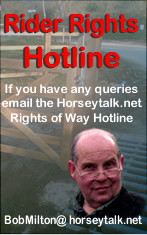
Horseytalk.net/Hoofbeat EXCLUSIVE
RIDER RIGHTS
Says Adrienne Yentis
 A friend of mine recently was riding on the heath
A friend of mine recently was riding on the heath
and she came across a group of cattle strung out across the bridlepath with no way through – the only way off was to turn round. Fortunately her horse
remained calm throughout. But you can imagine how a nervous horse might react ........... read more
Yateley Common, Hampshire
Tony Barnett explains why Hampshire CC
cannot create new bridleways across the common
"Sarah Manchester has made claims that section 193 LPA allows access from all points of view to include horse riding etc, like the rest of her knowledge on common land law, this is best taken with a pinch of salt"
Says Tony Barnett
 Sarah Manchester, director of Culture, communities and business services, proposes to create new bridle paths over Yateley common.
Sarah Manchester, director of Culture, communities and business services, proposes to create new bridle paths over Yateley common.
The 2006 commons act prohibits this act and the upgrading of existing rights of way over common land.
As of yet, the authority cannot categorize the definition of the common land between "Urban,Borough or Rural", yet this information should be registered and on file, so that members of the public and any government office can relate to the information when the need arises, in this case, the Planning Inspectorate.
It is my preemption that an application to pins may be about to be made by Sarah Manchester's office to carry out such works to create new access points.
For any highways act to be implemented on council held steel roads, does not need an application to pins, so, s 2.1 of the highways act 1980 s119 does not apply to foot paths over common land, this is where this council has quoted the crow act wrong, common land is subject to the 2000 crow act where access is from any/all points of view.
So the highways acts quoted do not relate to public rights of way over common land, the right of a "boat" over common land is reserved for owners of properties, attached to the common, this is part of the conveyance legislation which provides "that with out a lawful access to property,the property cannot be sold", a boat is that the property is not "land locked"
The application to pins will be made as land owners, this is what the information on page 3, item 4.1 states, landOwner: Hampshire County Council, the question of who owns the land Yateley Common was put to Andy Gratton-Kane, who refused to discuss the common, but did forward copies of the 1965 CRA and commoners rights, but no copy of the Common Owners Register, of course there are no owners or lawful occupiers other than commoners on Yateley common.
The application document to pins does require the application to be signed by the applicant, "are you the owner, or does the owner know of your application, so in essence, the statement on the forms forwarded is a statutory declaration, as the council's director of culture,communities and business Sarah Manchester has stated that the council own the land, then it is with the consent and approval of the CEO and legal office.
No documents are required by Pins to accompany the application, as neither are of the profession of conveyance solicitors, they are not qualified to adjudicate, however, if consent is given to the application it will only be "Provisional", a supplementary will be issued with the consent, if given to say" providing the works are not in breach of any enactments or bye-laws, they will be lawful, the applicant should be aware of the 2006 Fraud Act on false Representations!
As of yet, there is no statement to show what category/acts the common is registered.
The claim is that the common is owned by the council, which one? if so, then the council, as owners can make "A deed of Declaration and Order of Limitation under s 193 of the law of property act 1925",this automatically applies to all commons situated wholly or partly within a former borough or urban district.
The hint that the common is regulated is identified by the word "limitations" which means that access is regulated by definitive access points and any other access is prohibited, this goes for activities other air and exercise.
if the commons as has already been mentioned fall into an "Urban or Borough district", the the council has powers under the 1899 act to provide areas of recreation, but working alongside of commoners.
Now Sarah Manchester has made claims that section 193 LPA allows access from all points of view to include horse riding etc, like the rest of her knowledge on common land law, this is best taken pinch of salt, but she is not on her own in misleading guidance on the acts of Parliament.
On the intention of creating new access points, as mentioned the 2006 commons act provides that; any access used as of custom and not on the definitive plan or map, is extinguished, any access points on the definitive plan or map, if upgraded to a higher status will also be extinguished.
But councils like to play King of the Castle and go ahead with their agenda-s and create new unlawful access points, but, any new works on common land should carry public liability certificates, best be guided and to clear/reinstate the access points already on the definitive plan/map.
It has also been noted page 5; Natural England, the OSS, NFU, Cyclist and BHS, these have no jurisdiction on common land, EN are only interested in gaining funding from the EU by getting councils and other to identify SSSI and to have the commons enclosed, of course supported by the OSS.
To gain prosecutions for damage to SSSI, it must be on land that is other than common land or land stolen, common land is for public access and rights to the product by commoners, stolen land makes NE trespassers and liable to criminal damage. " criminal damage act 1971-1
It has also been reported that single white lines and double yellow lines have been painted alongside of the entrance to Yateley Common, these are unlawful, see 2000 crow act.
As for BHS, this is just an exercise in social climbing, they will not defend members rights or support access officers.
 Says Linda Wright
Says Linda Wright
We moved to a Shropshire location a year ago having surveyed the local OS map and noted the significant number of bridleways around the property. Sadly the map appears a total fiction. Scarce any of the bridleways are usable ........... read more



